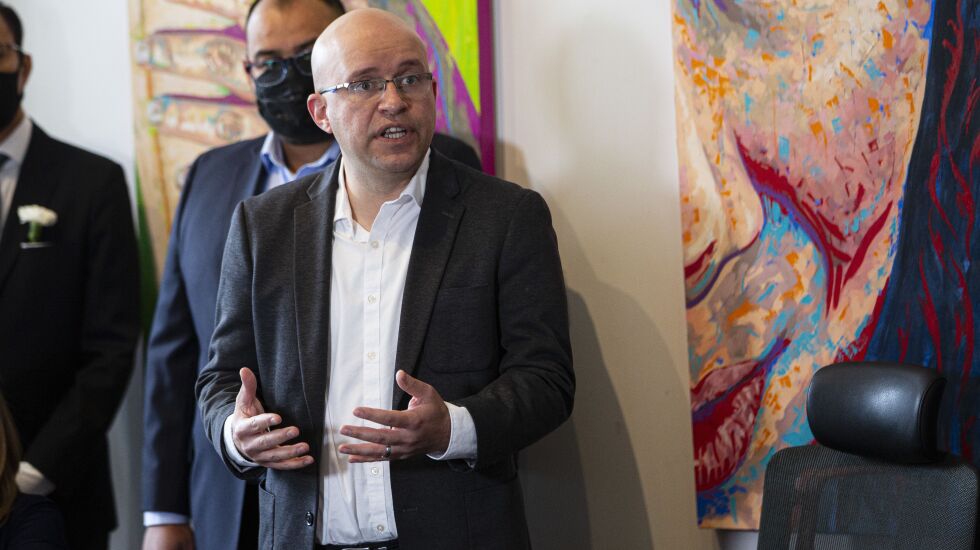
Marathon negotiations aimed at giving Chicago one of the most generous paid leave policies in the nation broke down Friday over the issue of guaranteed payouts.
Business and labor appeared to be closing in on a groundbreaking compromise brokered by aides to Mayor Brandon Johnson that would have required businesses to give their employees ten days of paid leave each year—five designated as sick days and five all-purpose days.
The ten-day mandate would have been down from a fifteen-day requirement in the original version introduced by Johnson’s City Council allies, but double what is envisioned in a statewide mandate scheduled to take effect on Jan 1.
But Ald. Michael Rodriguez (22nd), chairman of the City Council’s Committee on Workforce Development, said the number of days was not the major stumbling block.
What’s standing in the way of an agreement is the requirement that employees who don’t take advantage of all of their paid leave days be “paid out” when they leave their jobs.
“They want the ability to deny people taking their time off and not having to pay them out, which essentially means they have no paid time off,” Rodriguez told the Sun-Times.
“So basically, what they’re offering is five sick days and that’s it,” Rodriguez said. “Because they can deny every day and not pay it out...The issue is the payout...If workers don’t have the ability to take those days or be paid out for them, they’re not real days. There is no benefit.”
Jack Lavin, president of the Chicagoland Chamber of Commerce, said the guaranteed pay-out was one stumbling block — but not the only one — standing in the way of what he called “the most expensive, most expansive, most complicated paid leave in the country.”
“No other city is at ten days. They want to start it two months from now and, if you don’t comply, you can be sued. There’s no small business exemption. And you’re setting them up to be sued,” Lavin said. “New York has five days. No payout. This is ten days, double New York. L.A. has six days. No payout. No other major city has payout. This is 40% higher than L.A.”
The paid leave mandate is not being considered “in a vacuum.”
“You look at the tipped credit [phase-out]. The quadrupling of the real estate transfer tax, which is up next week [before the Rules Committee]. Supply chain, labor challenges, crime issue, skyrocketing property taxes, the lingering impacts of the pandemic,” Lavin said. “You’re piling on all of these things to small businesses. And now, you’re going to add this.”
A statement issued by a coalition of unions that includes the Chicago Federation of Labor, SEIU Local 1 and Healthcare, Teamster Joint Council 25 and AFSCME Council 31, maintained that labor leaders have made “multiple and significant compromises in a failed attempt to reach a deal “benefiting both sides.”
Union concessions range from the number of days and time on the job required to use that time off, to notice and documentation requirements and required approval, the statement said.
“After months of conversations and negotiations, it is unfortunate to see the business community walk away from negotiations and engage in desperate, over-the-top rhetoric often deployed when common sense worker protection laws are close to passage,” the unions said.
Rodriguez argued that workers “got a bum deal during the pandemic. They weren’t able to take off work. And many of them died.”
Senior mayoral adviser Jason Lee agreed that people are “coming into work sick because they have no paid sick leave or no paid time off.”
“That makes us all worse off. Not to mention the challenges that not having that puts on women and their participation in the workforce,” Lee said. “We need to...create conditions that allow people to work with dignity and also meet the needs of their families.”
If business leaders don’t return to the bargaining table, Rodriguez said the committee he chairs will vote Monday on a revised mandate requiring Chicago businesses to give their employees twelve days of paid leave each year — six designated as sick days and six all-purpose days.
Employees who don’t use the all-purpose days would be “paid out when they sever employment,” he said.
The City Council’s Rules Committee is also scheduled to meet next week to place a binding referendum on the March ballot asking Chicago voters to “quadruple” the transaction tax on high-end real-estate sales to generate $100 million in annual revenue to combat homelessness.
Business leaders are promising to spend big money to defeat the referendum—first in the City Council, then at the ballot box.







